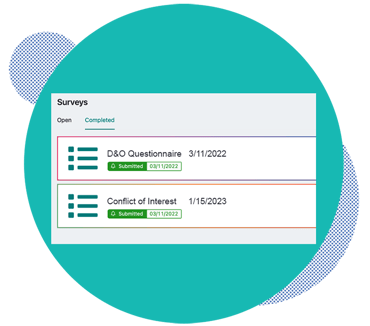There’s no recipe guaranteed to create the perfect board of directors, but there are best practices that can help ensure your board has the highest possible likelihood of success. Conducting regular board assessments is one such practice that should be adopted by every board of directors.
The most useful board assessments are unique to each board, since assessments should be based on objectives and goals set by the board. Individual and collective assessments help measure performance against predetermined goals, as well as set new objectives and goals for the future.
There are simple but critical steps to follow when preparing board assessments. 
Define an Effective Board Assessment
What does an effective assessment mean to your board and organization? What aspects of your board are you trying to understand and evaluate? Answer these questions before starting the assessment process. A clear understanding of the desired outcome will help boards make the most of their assessments.
Surveys and assessments of individual board members may be included in the board assessment, but there may also be reviews of the board structure, as well as its procedures and practices.
The following areas are typically reviewed in a board assessment:
-
Board of directors and committee structure and composition
-
Working relationship between the corporate secretary, the board of directors, and executive management
-
Legal entity structure
-
Operation of board committees
-
Current corporate governance principles, practices, procedures, and objectives
-
Board and committee resolution approval processes
-
Delegation of authority processes
-
Board practices and procedures relative to potential director conflicts of interest
-
Foundational documents to determine which governance practices are mandated
-
Governance process and procedure documents, including historical records
-
Director and officer indemnification practices and procedures

-
Outline of director and officer training programs
-
Subsidiary and joint venture governance management practices
-
Use of third-party corporate governance service and product vendors
The highest-performing boards remain organized throughout the assessment process by using a secure digital board management solution that allows them to create and deploy complex board assessments.
Key Board Member Assessment Questions
As outlined, board assessments should be customized to your board’s structure, procedures, obstacles, and limitations. There are some assessment questions that may be helpful when drafting board assessment processes, or that may be modified to suit your needs:
-
Does the board’s governance document provide the best structure and processes to facilitate desired results?
-
Do the board’s meeting agendas allocate sufficient time for discussions of strategy?
-
Are the board and committee roles and responsibilities understood by the board?
-
Do the criteria for board member selection and committee membership facilitate an effective board of directors?
-
Are board and committee roles in identifying and managing cybersecurity and other risks defined and understood?
-
Is management of material risks assigned to appropriate members of the executive management team?
-
Are board, committee, and director evaluation results being employed to improve board performance?
Use these questions to assess processes and documentation, and ask individual board members in interviews or surveys. 
Board, Committee, and Director Assessments
Board assessments include the review of overall board structure, processes, and practices, but they may also include individual evaluations of directors. In fact, in recent years, there has been an increasing focus on board and individual director evaluations as a key part of board assessments.
Individual Board Assessments
Individual director assessments are typically done via questionnaires or interviews, including surveys that directors can complete on their own time. Individual assessments should be used to truly measure the performance and effectiveness of each director, not to demean or blame board members.
It’s common for individual assessments to evaluate skill sets, competencies, and priorities of each director. The results can help boards create plans to improve individual director effectiveness and develop comprehensive board cohesion.
Individual assessments allow each director to weigh in on
-
What's working best
-
What requires strengthening
-
What challenges may lie ahead
-
Which issues they feel are important but may not yet have addressed
Board assessments are an important tool used by successful organizations to measure historical corporate governance practices against current practices, in order to better meet projected goals.
Assessments evaluate the composition, structure, procedures, legal matters, and working relationships between directors, and they help boards assess and set goals and objectives.. Assessments should ultimately improve board and individual effectiveness while reestablishing priorities, goals, and general cohesiveness.
Other posts you might be interested in
View All Posts
Corporate Governance Assessments: Critical Components of Good Governance
Read More
Simplify Board Assessments with Modern Best Practices
Read More
Implementing Board Reporting Software for Optimal Oversight
Read MoreSubscribe to email updates
Get updates delivered directly to your inbox.
 Board Management Software for Better Governance
Board Management Software for Better Governance Govenda Brochure
Govenda Brochure